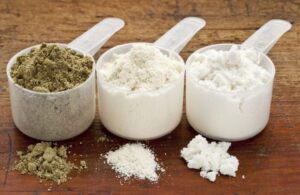Did you know that protein powder is not only for bodybuilders or athletes? As per nutritionists’ recommendations, there are various protein powders at mainstream supermarkets that can be incorporated even in your favourite smoothie. And that’s not all.
We’re going to discuss next what exactly protein powder, its benefits, pros and cons, and the best type of protein powder you can try.
Here is what you need to know.
Protein Powder 101: What Should You Know
Protein powder is usually made from one or more types of protein (obvious, right?), isolated from food and turned into a dried, finely powdered form. So what could be its source?
Protein powders’ source is either animal, like dairy-derived whey, eggs, or plants, such as peas, pumpkin seeds, soy, rice, hemp, and quinoa.

How much protein powder do we need?
A portion of protein powder is approximately a quarter cup, meaning just a few scoops. Also, a serving is usually 20-25gr of protein.
To figure out how much protein powder you need, you can always discuss it first with a nutritionist. However, as per the Recommended Dietary Allowance you should know that:
- a healthy adult with a low physical activity level needs: 0.8gr/kg (2.2 pounds) of body weight/daily;
- protein intake should increase based on your age and activity level: 1.4 to 2gr/ 2.2 pounds of body weight is ideal for strength training or building muscle mass; 1 to 1.2gr/2.2 pounds of body weight for those over 65 years old.
You should also know that one portion of most protein powders is almost the same as a 3-ounce chicken breast (skinless) and just a few grams more than a cup of cooked lentils.
You can start consuming protein powder as an alternative to other protein foods or boost a serving that’s low in protein. For instance, you can add protein powder in a smoothie made only with fruits or veggies. That is the easiest way to turn a delicious drink into a meal replacement.Â
Side Effects
Back in 2018, the Clean Label Project realized a study analyzing whether contaminants, like heavy metals, can be found in protein powder. The results are not concerning.
More than 130 protein powders were examined, and 75 % of them contained measurable levels of lead.Â
Furthermore, a 2020 research found that up to three daily serving of protein powder is not linked to a high risk of non-cancerous health effects due to heavy metal exposure.
Protein Powder Recommendations

If you never tried protein powders before, remember that it’s better to discuss it first with a nutritionist. However, the best products should be unflavored, unsweetened, just plain protein powders because you can always choose to add your favourite all-natural seasonings.Â












nice